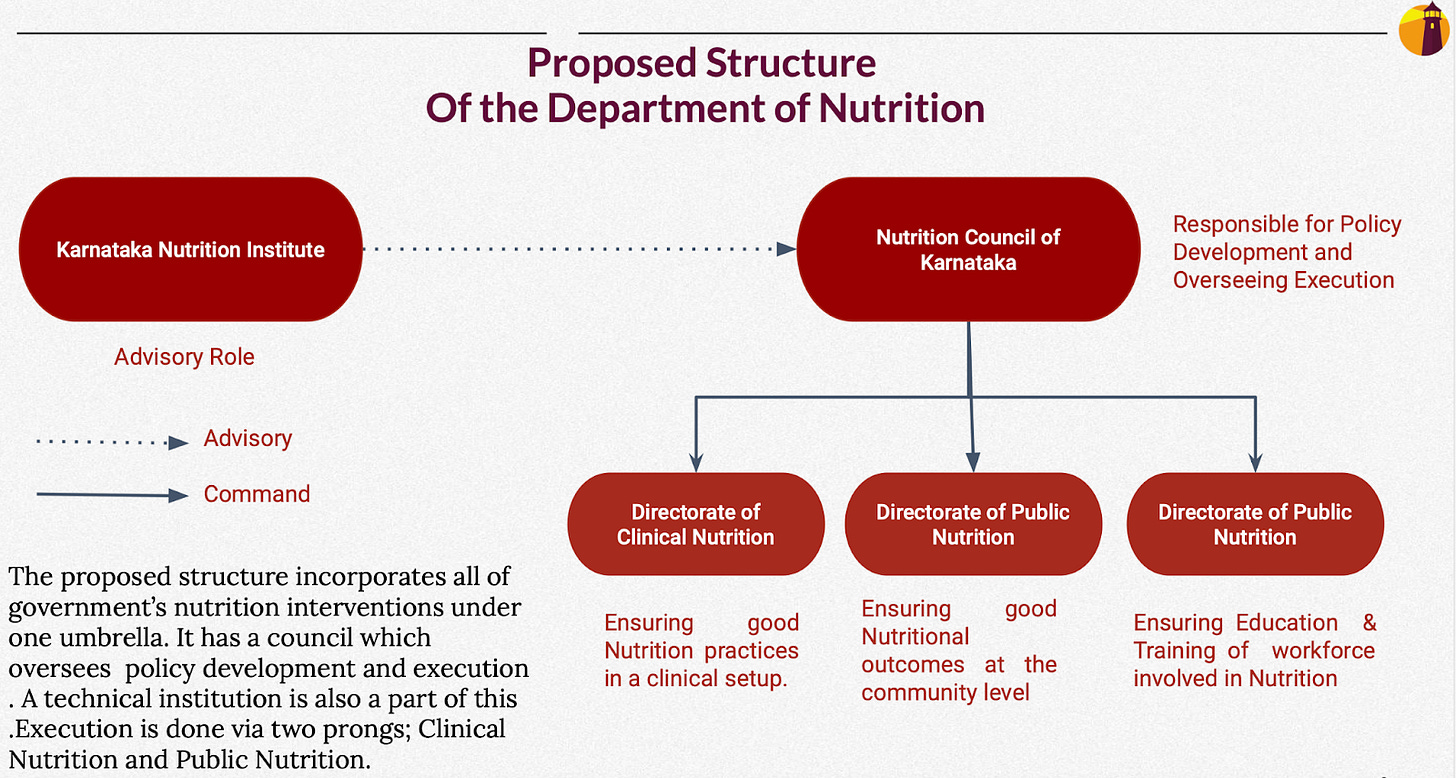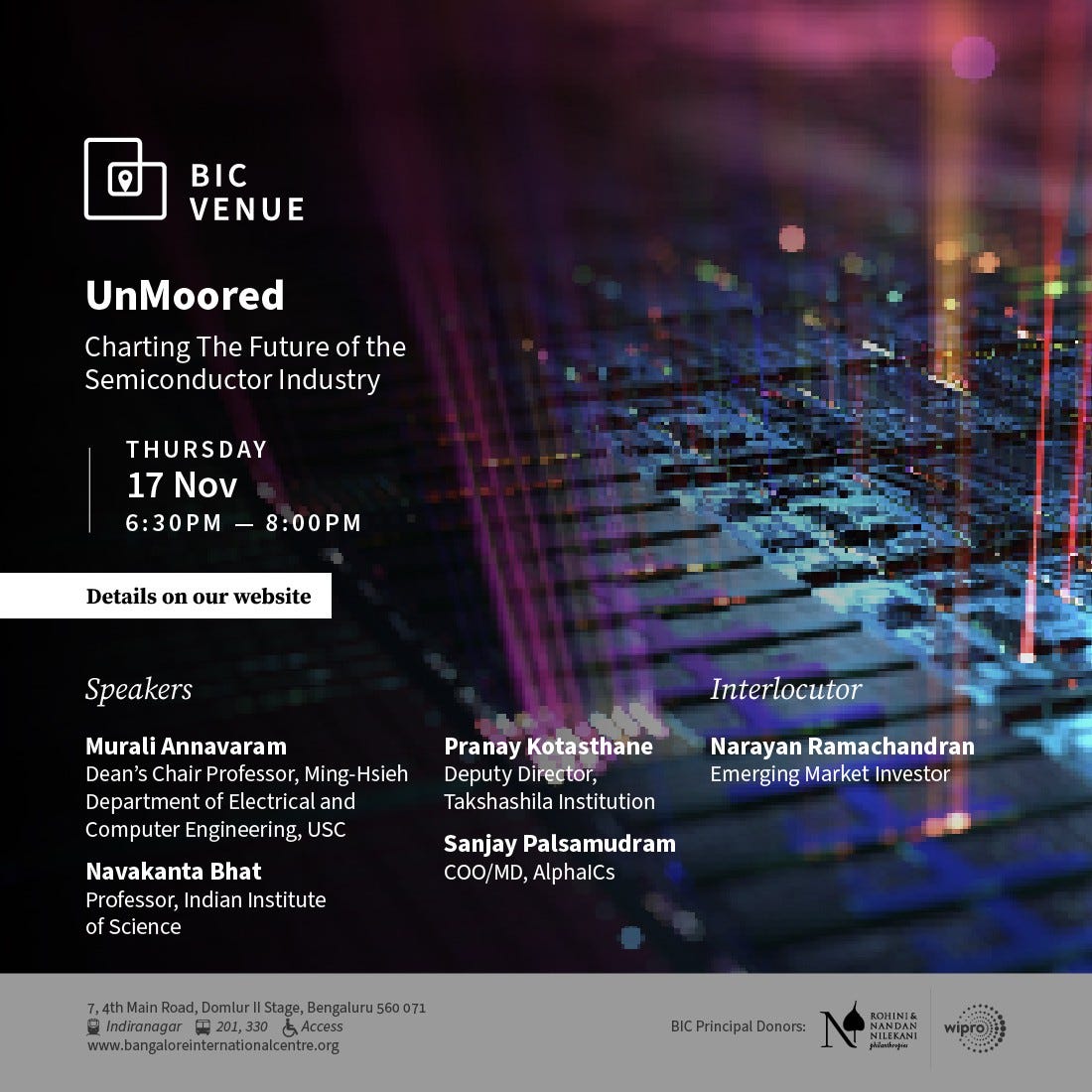Fighting Malnutrition Through A New Approach
Dear Reader,
Hope you are doing well. In this edition, we cover our latest work on combating malnutrition caused by overnutrition, policy lessons from the ongoing GM Mustard debate, abolishing the Sahayak system in the Indian Army, implications of the U.S. midterm elections for India, developments in the telecom sector, and much more.
Also, Pranay Kotasthane and Narayan Ramachandran from Takshashila are participating in a panel discussion on the semiconductor industry on Thursday, November 17 from 6:30 p.m. onwards at the Bangalore International Centre - register now to join the conversation.
Fighting Malnutrition Through A New Approach
Malnutrition in India, traditionally associated with undernutrition, is now also being caused by overnutrition among our populace. In our latest research publication, A New Approach to Nutrition in Karnataka, Shambhavi Naik and Harshit Kukreja recommend the separation of clinical and public nutrition approaches to better tackle malnutrition in the country. While public nutrition is focused at the community level and is preventive, clinical nutrition interventions are aimed at individuals and work better for overnutrition-related malnutrition, such as in the case of obesity.
In the context of the State of Karnataka, after assessing the existing public nutrition governance structure, they recommend an overhaul aimed at separating the approaches to tackle malnutrition to achieve better outcomes.
India’s Gene Editing Governance Framework
Late last month, the Genetic Engineering Appraisal Committee (GEAC) approved the environmental release of a genetically modified mustard (GM Mustard) for seed production and testing before its commercial release. The use of GM crops has remained controversial in India, with Bt. Cotton is the only such crop currently being cultivated. The GM Mustard issue is before the Supreme Court of India currently.
In our latest Issue Brief, GM Mustard Offers a Chance to Relook at India’s Gene Editing Governance, we argue that an enabling regulatory framework that allows the technology to grow will help India navigate its food security and healthcare problems. It must take into account both the scientific risks and ethical considerations. Based on our past work, we propose a 3-tiered pyramidical framework for deciding gene editing applications in India:
End Army’s Sahayak System
In his weekly column for ThePrint, Lt. Gen. Prakash Menon writes that time has come for the abolition of the Sahayak system in the Indian Army:
The days of utilising Sahayaks for domestic purposes in the Armed Forces certainly seem to be numbered. But this may not be the case in the larger national and state-level government structures. The practice of using government employees by certain levels of officials is widespread and unchecked. The Parliamentary Committee specifically mentioned the Ministry of Home Affairs and its organisations.
The prevention of government employees for domestic chores should become a major domain of reform requiring urgent implementation. For, there could be more ‘Bada Sahebs’ warming the chairs of civilian government departments at the central and state levels. Misutilisation and misdirection of human capital is the Achilles heel of the Indian social and bureaucratic systems. Without reform in this field, India cannot expect to leverage its true human potential.
What the U.S. Midterm Election Means For India
While the U.S. Senate has been retained by the Democrats, the fate of the House of Representatives still hangs in the balance as the counting of votes is on. Sachin Kalbag, in an article for the New Indian Express, discusses the implications of the midterm election’s results for India:
There are two major global issues in which a stalemate is almost a certainty – climate change and the war in Ukraine (the latter is where India's diplomatic strength and guile will be put to test).
Take climate change. Democrats are pro-legislation in order to mitigate the impact of climate change. Republicans, on the other hand, are mostly climate change deniers, and have repeatedly said they will not support funding for alternative fuels. This is likely to impact the American stance on a global alliance to slow down or possibly reverse climate change. The Republicans are also pro-stricter immigration laws. It is here that Indians will be impacted the most. In any case, the visa-issuing gridlock has not been resolved, with some visa appointments taking more than a year -- or even two -- to fructify.
Telecom Sector in India: 5G & The Future
The Telecom sector is crucial to India’s economic growth and national security. In last Thursday’s episode of All Things Policy, Shrikrishna Upadhyaya spoke to Aaditya Dighe, Investment Specialist, Invest India, on foreign investment in the telecom sector, domestic manufacturing of telecom equipment, the challenges in the ongoing 5G roll-out, and alternatives like Satcom based internet services.
Meltdown in Afghanistan
Anand Arni, Distinguished Fellow, The Takshashila Institution, appeared on ThePrint #Crosshairs with Praveen Swami, Tara Kartha & Suchet Vir Singh on November 5, 2022, and discussed the meltdown in Afghanistan since the Taliban took over the country last year.
Watch the full video here:
Upcoming Event: UnMoored - Charting The Future of the Semiconductor Industry
Pranay Kotasthane, Deputy Director, Takshashila Institution will be participating in a panel discussion on the semiconductor industry on Thursday, November 17 from 6:30 p.m. to 8 p.m. at the Bangalore International Centre. The discussion will be moderated by Narayan Ramachandran, Co-Founder & Senior Fellow at the Takshashila Institution.
The panel will set the context for the design, manufacturing and assembly of semiconductors, the fragile geography of the industry and the humongous capital requirements. It will discuss the future in this context and will address the implications for India.
The event is free to attend upon prior registration.
Applications for PGP Programme are Now Open
The Post-Graduate Programme in Public Policy (PGP Programme) is a 48-week multi-disciplinary, specialised programme, designed for students who wish to gain a deeper understanding of the theoretical and empirical approaches to public policy.
The PGP Programme is suitable for working professionals who are in the public policy space or are looking to explore a career in public policy while pursuing current occupations. Prior work experience of 2 years is a desirable criterion for admission. The PGP programme will equip students with the necessary skills of policymaking, analysis, persuasion, and communication in their desired career choice.
The last date for early bird application is December 20, 2022!
That’s all from us in this edition. Take care.





